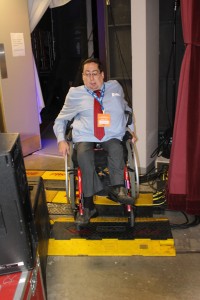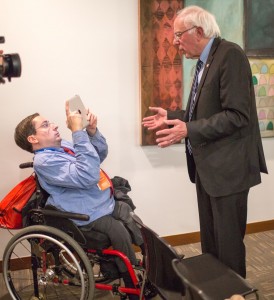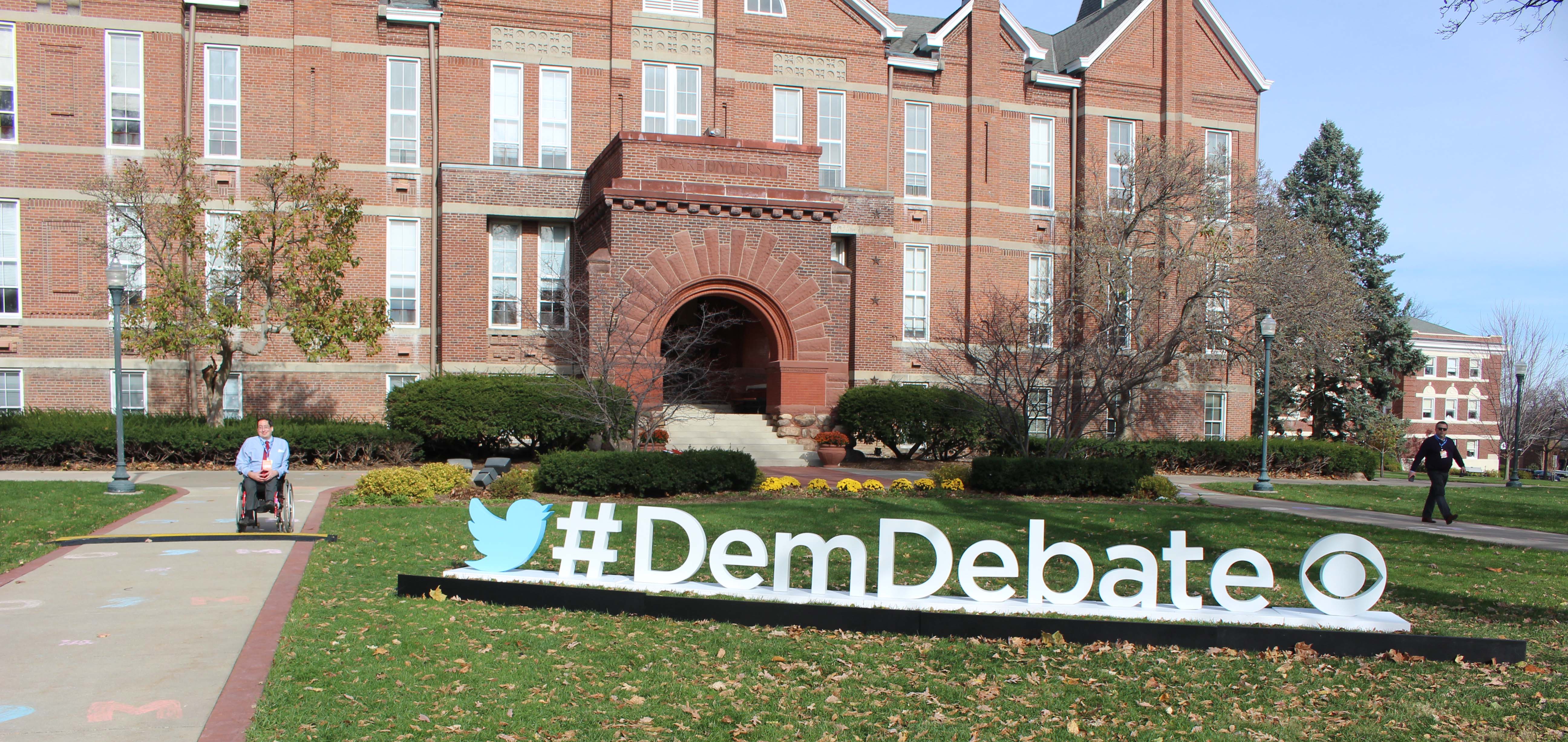
Washington, Dec. 30 – I’m Justin Chappell, one of The RespectAbility Report’s newest reporters. I also have Spina bifida, and, as a result, use a wheelchair. But this does not limit me. There are negative stigmas out there that discriminate against people with disabilities. But these stigmas are inaccurate and I live a very full life. Today I own my own place, am married to the love of my life, and now, on behalf of RespectAbility, I am interviewing presidential candidates!
The RespectAbility Report is a new online publication sponsored by the nonprofit disability rights and opportunity group RespectAbility. Our publisher, Jennifer Laszlo Mizrahi, worked at Campaigns & Elections magazine and had a newspaper column for many years. Our editor, Lauren Appelbaum, has advanced degrees in journalism and worked in NBC News’ political unit with Chuck Todd and Andrea Mitchell.
Personally, I have worked for Sen. Tom Harkin of Iowa, a major disability leader who was key to the Americans with Disabilities Act and Workforce Innovation and Opportunities Act (WIOA), as well as in the Independent Living movement. Our team is filled with self-advocates and experts on disability issues and we have a thriving fellowship program where young leaders can get concrete skills in politics, journalism and public policy. Our publication focuses on the intersection between politics and disability issues.

I started covering the candidates by spending the month of November with fellow disability community leaders traveling throughout Iowa, using my wheelchair in nearly nine inches of snow to interview almost every candidate for president on both sides of the aisle. Since then our team has covered candidates at debates and events in New Hampshire, Nevada, Colorado, Washington, D.C., and beyond.
In Iowa our travels took us from the state capital of Des Moines to Em’s Coffee Shop in Independence as we asked the presidential candidates how they would be a voice for people with disabilities and how they plan to engage people with disabilities in the political process.
A major issue for the disability community is the economy. More than 70 percent of people with disabilities are not employed, and we’re pressing the candidates to develop real plans to address this issue.
As a wheelchair user, I understand the importance of reaching out to the candidates on issues affecting people with a variety of disabilities. In this new world of nonprofit journalism, I’m advocating for better accessibility – from captions on videos and information necessary for screen readers on the candidates’ websites to physical accessibility at campaign events and fundraisers.
If a candidate wants to be president, it is important that anyone should be able to attend a campaign event – and for his or her information to be able to viewed and shared by all. Our group is a non profit, so we have to be especially careful to cover all the candidates fairly and to avoid any politicking. Don’t expect us to endorse anyone, for example. We will bring you information and interviews from all the contenders so that you can make a clear choice based on facts.
My first interview with a presidential candidate happened after being seated next to the exit door of Hillary Clinton‘s debate watch party in Des Moines. I positioned myself in front of Clinton’s path and asked to speak with her. She invited me to join her backstage for a quick interview. It was her first interview on this topic this campaign cycle. The campaign must have been happy with our coverage because they forwarded the interview around. The core things that she said also are on her own campaign website. Moreover, after we spoke to her campaign (and all the others too!) about the importance of captions, the Clinton campaign, like Jeb Bush’s campaign, quickly added captions on 95 percent of its videos. While half of them have the imperfect auto-captions that YouTube provides automatically for free, 43 percent of Clinton’s videos are hand-captioned with fully accurate captions. Captions are vital for people with hearing impairments so you will see a special piece on this topic soon from a member of our team who is hearing impaired himself.
Knowing that I was staying at the same hotel as presidential hopeful Martin O’Malley, the morning following the Des Moines debate, I interviewed the former Maryland governor when we were eating breakfast. I’ve learned the importance of taking advantage of the moment and seeking out as many opportunities as possible to reach the candidates. O’Malley’s team has shown a real interest in disability issues and has met with us and other disability experts many times. During this time, his polling has risen from statistically zero to seven percent!
Of course, I interviewed candidates from both political parties, including Sen. Ted Cruz, who immediately agreed to an interview after stepping off the stage where he spoke at the Presidential Family Forum. At this event, I also spoke with Donald Trump, Gov. Mike Huckabee and Sen. Rick Santorum. You can find all those interviews at The RespectAbility Report. It’s always interesting, however, to see how people react to someone who uses a wheelchair. Do they take the time to sit down so they can look at you eye level? Do they react to you differently than they do other people who don’t have wheelchairs?

Because it’s impossible for me to push my wheelchair and hold a camera at the same time, I use an iPad as my camera/camcorder. As I sat using it with Donald Trump, he assumed I was holding it up to get it autographed. So now I have both his autograph on the back of my iPad AND a video of him doing it!
Now, I’m heading back to Iowa to cover the disability community and issues in the Iowa caucuses. Later I will be covering the New Hampshire primary. In both cases we will continue working with local disability leaders to press candidates to not only talk about our pressing issues but also to walk the walk by making websites and events more accessible.
I invite you to join me and our team. Attend events with me or on your own. Let us know if you notice something great, like campaigns having ASL interpreters or live captions, or if you have an issue regarding accessibility. By holding fast to our community’s motto of “nothing about us, without us,” together we can ensure that changes occur for the better. You can do your part by becoming a citizen journalist.
There is no cost to read The RespectAbility Report but, while we’re doing this as inexpensively as possible, we need your financial support. Only a few days are left to get your 2015 tax deduction for your charitable donations. Thus, please donate HERE today so we can continue our work to ensure that the voices of people with disabilities are heard!
As disability rights leader Justin Dart said, we must all “get into politics as if your life depends on it, because it does.”

Be First to Comment